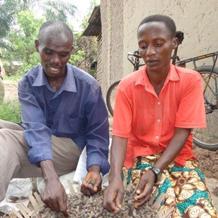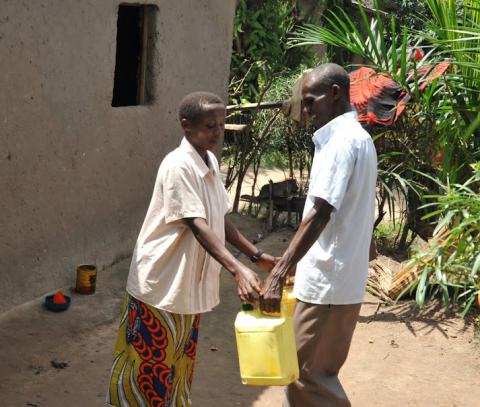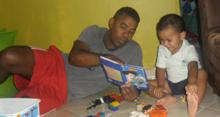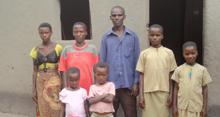HEROES
Heroes
Exclusive one-on-one interviews with extraordinary individuals working on behalf of women, children, and families worldwide.

HIS DREAM
“My dream is to walk the hills, towns, and provinces in search of men who are as I was before, talk to them about my past, and get them to change. I believe that if most of families were like mine in Burundi, the country would be more developed we would live in peace. A country where fathers do not respect human rights, especially those of women, cannot thrive.”
WHY HE’S A HERO
In Burundi culture, gender roles are strictly defined, with women and mothers responsible for household duties, but holding very little power in their marriages, families, and communities. Hatungimana Sylvestre, a married father of four girls, previously ascribed to these roles, and paid little respect to his wife—until he began participating in CARE’s project called Kirumara and became an umutangamuco, or “bringer of light” (also called Abatangumoco). This men’s group in Burundi helps end deep-rooted gender discrimination in their culture, and works with men in the community to help them realize the potential of women and create equality in their marital relationships. Hatungimana was one of the earliest participants in the project, and has since developed a much more equal and loving marriage. He also recruits other men in his community to participate in the project.
A CHAT WITH HERO HATUGIMANA SYLVESTRE
IMOW: How did you get involved with Kirumara? Please tell us your story.
HATUNGIMANA: It all started when CARE came to Burundi for their Kirumara Project. This project works with women's groups to teach women’s empowerment, and my wife is a member of one of those groups. One day, the project invited the husbands of the members to a workshop about women’s rights training.
All the examples that the trainer gave reflected my relationship with my wife. For example, she spoke about men who beat their wives, who are in cohabiting relationships, who abuse their women who give birth to girls only; how they waste the resources of the household, how all the household activities lay only on their wives, etc.
IMOW: Was this the norm in Burundi?
HATUNGIMANA: Yes. For example, my father would not carry a hoe when he was with my mother. I thought that's what being a real man meant, so I did the same thing with my wife. She would carry 20 liters of water on hear head, a child on her back, her own hoe and my hoe too, and I’d walk behind her with only a machete in hand.
IMOW: What inspired you to change?
HATUNGIMANA: When men from [a nearby community] who had participated in Kirumara project came to give their testimonies about their experiences, I felt they pointed the finger at my behavior. Mostly I saw and understood that men can turn their negative cultural traditions around and can change their ways. It was the first time I heard about men sweeping, cooking, fetching water, or taking care of a baby.
After hearing the testimony of other men, I made a deep examination of conscience, and I realized that I was very silly. I began to go with my wife to the field, and to fetch water at night in secret to avoid being seen by neighbors, because it is culturally shameful for a man to do so. When I realized that people knew that I fetched water, I continued to fetch even during the day and I started to do other taboo activities such as sweeping, bed making, etc.
IMOW: How did your community react?
HATUNGIMANA: Obviously, it was not easy. People laughed at me and asked questions about me. For example, they said I was bewitched by my wife. But I did not lose courage, because I saw results: the inner peace, the confidence of my wife, understanding each other, love. There is no comparison—with all these improvements, I accepted being ridiculed by my neighbors.
Now, I am envied by the community, and they trust me and come to me for managing conflict in their households. For example, the governor came into the community to see the men who participated in Kirumara, and he said the government supports our actions.
IMOW: How does your wife handle the fact that your behavior changed so much?
HATUNGIMANA: When my wife saw me starting to sweep and fetch water, she did not understand what happened to me. She was very touched and amazed at the same time. Gradually she realized that I was determined to support her, and she began to show enthusiasm.
This encouraged me to talk to her honestly, and this has strengthened our love and mutual trust. My wife is very happy. She loves me very much. She tells me about everything. She is not afraid of me. Before, she would ask my permission for anything she wanted to do; now, there is no need of this.
IMOW: What made you decide to become a more active father?
HATUNGIMANA: I decided to take an active role as a father because I want Burundian women to have dignity. When there is peace within the household, children grow in a supportive environment. I believe in the power of women who, and I believe women should not be exploited because of cultural barriers. Women are intelligent and capable, but their skills are not valued because of the culture.
IMOW: How would you wish your community to change in the future, and what needs to be done to achieve this change?
HATUNGIMANA: I would hope to hear one day that there is no more violence toward and cries of exploitation from women in my community. It is a bitter root against the development of households and community.
We should form a men’s coalition against violence. It would promote good treatment of their wives and daughters, as it is mostly men who are perpetrators of violence. This could also save the youth, the future generation. The government and other local and international organizations understand that violence against women is a root cause of household poverty in Burundi.
IMOW: What’s the change you’ve been able to instigate that you feel most proud of?
HATUNGIMANA: The change in my household. I am honest with my wife and do my best to make her happy. I am involved with the upbringing and education of my three daughters, so they do not become victims of violence. At the community level, I will continue my struggle to win more men, and together we will fight against violence.
Take Action
Support projects such as Kirumara, which teaches gender equity in culture's such as Hatungimana Sylvestre's! Donate to CARE today>>
Related Content
|
Márcio Chagas da Paz is a father who collaborates with Promundo, a Brazilian NGO that seeks to promote gender equality and end violence against women, children, and youth. |
With more men willing to take an active role as fathers, rather than just be the family breadwinner, it seems we’ve come a long way toward gender equality in parenting—or have we? |
This documentary follows a family in Hungary where the father stays home as caretaker and the mother is the primary breadwinner. |
Father and author Jeremy Adam Smith describes how being a father has changed over the years and what we need to call into question in order to redefine fatherhood. |






